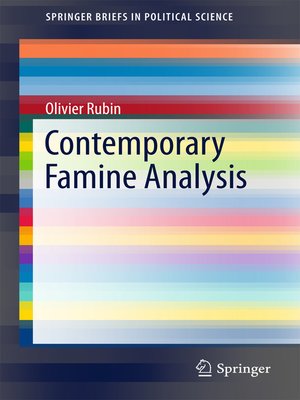
Sign up to save your library
With an OverDrive account, you can save your favorite libraries for at-a-glance information about availability. Find out more about OverDrive accounts.
Find this title in Libby, the library reading app by OverDrive.



Search for a digital library with this title
Title found at these libraries:
| Library Name | Distance |
|---|---|
| Loading... |
This Brief provides some answers as to why famines continue to torment humankind here in the 21st century despite all our progress in food production, logistics, information dissemination and relief work. Contemporary famines are inherently political, and so the interesting question is not how famines can be prevented, but why they are allowed to develop in the first place; only by understanding the latter, is there hope to eradicate major famines.
The Brief assesses the various analytical approaches to the understanding of famine, from the classical approaches inspired by Thomas Malthus to the newer economic approaches based on Amartya Sen. While all approaches contribute with important insights on famine dynamics, they also struggle to capture the political dimension of contemporary famines. The Brief develops a political approach capable of addressing this important but messy political dimension of contemporary famines. The approach builds on principles of humanitarian accountability (the moral responsibility to alleviate suffering from famine) as well as political accountability (the interests and power relations involved in famine outcomes).
The Brief assesses the various analytical approaches to the understanding of famine, from the classical approaches inspired by Thomas Malthus to the newer economic approaches based on Amartya Sen. While all approaches contribute with important insights on famine dynamics, they also struggle to capture the political dimension of contemporary famines. The Brief develops a political approach capable of addressing this important but messy political dimension of contemporary famines. The approach builds on principles of humanitarian accountability (the moral responsibility to alleviate suffering from famine) as well as political accountability (the interests and power relations involved in famine outcomes).







